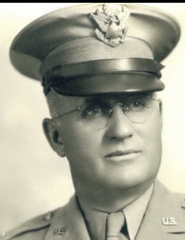Iowan Cracks Safe -- It's OK In This Case
By Frank Miles
(Daily Time Herald War Correspondent)
In the Field with the First Army (IDPA) -- Staff Sgt. Wayne Kirby, Essex, Iowa, and three other doughboys were cracking a safe in the palatial residence of a once high ranking nazi.
The stocky sergeant, a Montgomery county farmer in civilian life, was a member of the outfit which had captured the town where the Hitlerite's home was located. Because of the man's prominence in the nazi party, American officers directed that a diligent search be made of his premises with special attention to secret recesses.
That's why Sgt. Kirby was doing a job that normally would be foreign to his desires.
An hour after I met him there, I said goodbye to him and his platoon when they left with carbines and field rations on a mission. Jerries were 2,000 yards away.
Outside I noted the house had been hit twice by American explosives and thought of a sign I saw in the debris of a structure in a neighboring town:
"I Voted for Hitler."
Later that day I jeeped as far along a road as MP's would allow vehicles to go, then walked a half mile through woods to reach a ridge. From there I could see American and German tanks fighting in an area around a huge brick factory, where nazi infantrymen were entrenched. The Yanks were beating our adversaries. I saw flames shooting from one of our tanks, which had been knocked out.
Across the field between the woods and factory came a lieutenant with an arm around a bleeding, muddy private, who walked on tottering legs. The wounded lad looked dazed but half smiled when I looked at him.
"How are you doing?" I asked.
"Not too bad, sir -- thanks," was the reply.
Just after I got back into my jeep a nazi shell exploded close enough to almost lift us off the road. My driver got us out of there with all speed.
Second Lieutenant Roland H. Lavrenz, Algona, of the Seventh armored division, has been awarded the Silver Star for gallantry in action when he silenced an enemy tank with a BAR gun in Belgium.
Lieutenant Bernard J. Coen, Sioux City, of the Eighth Infantry division, has received the third Oak Leaf cluster to the Air Medal for completing 140 sorties directing fire on enemy positions and making reconnaissances over enemy territory, defying enemy anti-aircraft fir and air attacks.
Lieutenant John P. Wakefield, Des Moines, was near a place where a German shell bore through 70 American 105's in a dump before it exploded, causing a terrific conflagration. Miraculously, no one was hurt.
Enemy bombing planes and our ack ack guns kept me awake most of the night before this was written. Reports were that 20 of the marauders were shot down. I saw two, which had crashed with the mangled bodies of their pilots in the wreckage, as I returned to forward press camp.
Source: Carroll Daily Times Herald, April 3, 1945
![]()

